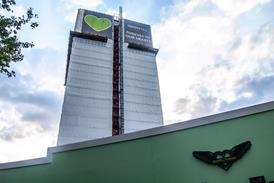Finalists included HOK, Penoyre & Prasad and Schmidt Hammer Lassen
BDP has been named as the preferred bidder for a new adults’ hospital and a new home for Leeds Children’s Hospital at the current Leeds General Infirmary site.
The architect was appointed to the twin £600m redevelopment project by Leeds Teaching Hospitals NHS Trust after an international design competition.
The trust was one of six to be awarded a share of £2.7bn of funding as part of the first wave of the government’s health infrastructure plan (HIP).

BDP, which was behind a number of the Nightingale hospitals, landed the £9.5m lead architect role.
The practice beat four other architects that were also in the running to be named as the lead designer.
CF Moller, HOK, NBBJ and a Penoyre & Prasad and Schmidt Hammer Lassen team were also on the shortlist.
BDP had also been in the running for the civil and structural designer role, joined by Curtins Consulting, Mott MacDonald, Arup and WSP on the shortlist.
The Leeds trust appointed WSP as its civil and structural designer on a £3.5m deal with Arup named as the client civil and structural technical advisor under a £450,000 role.
The work at the Leeds General Infirmary, better known as the LGI, will include a new adult hospital and a major site for the Leeds Children’s Hospital.
As such it has in place the funding and planning approvals, having already received outline planning permission, to design and build both a hospital for adult healthcare and a purpose-built children’s hospital.
BDP’s first design concepts propose a circular hospital structure which it said was shaped like the contours of the Yorkshire fells and dales, with a large island garden and play deck at its centre.
Outdoor space and play areas were some of the facilities that children and young patients suggested in the design competition, held last year, which the architects said inspired them with their latest concept.
The programme, known as Hospitals of the Future, is part of the government’s commitment to build 40 hospitals by 2030, backed by an initial £3.7bn. It will see more than 94,000sq m of healthcare facilities built.
The trust is looking to use Design for Manufacture and Assembly and modern methods of construction on the job and is also aspiring to be the first trust in the HIP programme to be accredited to the Well Building Standard.
Last year it was revealed that Ryder had been chosen to lead the design of the new Whipps Cross Hospital in north east London, another one of the HIP hospitals projects.
















No comments yet